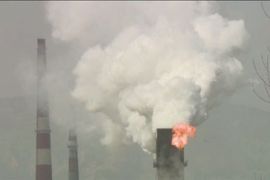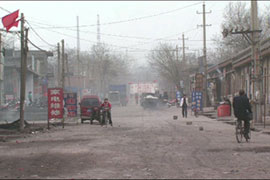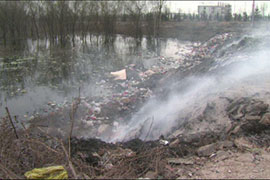China chokes in its own pollution
The government has decided to go green with strict action against polluters.

 |
| Linfen has the ‘honour’ of being the world’s dirtiest city |
A key goal China has set at this year’s parliamentary session is to cut pollution levels. It is part of Beijing‘s bid to keep the economic engine pumping while cutting back on social costs.
Keep reading
list of 4 itemsAfter the Hurricane
World’s coral reefs face global bleaching crisis
Why is Germany maintaining economic ties with China?
Achieving greener growth will be a challenge for China – the largest polluter in the developing world.
The World Bank says 16 of the world’s 20 most polluted cities are in China. About 70 per cent of the country’s rivers are polluted, largely by toxic waste pouring out of factories.
As a result, more than half of China‘s population, or about 700 million people, lack access to clean drinking water.
Dirtiest of all
Linfen in Shanxi province has been given the dubious honour of being the dirtiest city in the world by the World Bank.
Deep in coal mining country, everything is covered in a coating of black dust. There are untreated piles of waste lying everywhere.
But the most harmful pollution is the toxic gas emissions, prolonged exposure to which could lead to very serious consequences.
Andres Liebenthal of the World Bank said: “It increases the frequency in which people get sick and see the doctor and die.”
China‘s pollution comes from huge clouds of smoke and flames billowing from chemical plants that surround the city.
The country has some of the toughest environmental legislation in the world but the message is not getting through.
The pollution is so bad that it has seeped deep into the earth. Farmers on the outskirts of Linfen have seen their crop yields falling dramatically.
A woman said her grain harvest had dropped by about 30 per cent in the past few years, just enough to feed her family.
Polluted waters
 |
| Rivers are polluted by raw waste water discharged from factories |
On a tributary of the great Yellow River, the cradle of Chinese civilisation, the water now runs black.
In the city itself, the pollution is just a part of everyday life. The 4.5 million people who live here do what they can but it is often not enough.
“I have to live in such a harsh environment, but there’s nothing I can do about it,” a female resident of the city said.
“I’m really, really worried about it. It’s too polluted here,” said a man of the city.
Linfen is not an isolated case. The booming factories and the fuel that keeps them going have left a filthy trail all across the country.
Enforcing legislation is tough because local governments do not want to bite the hand that feeds them.
“At the local level, you know … we can understand that it’s politically difficult for local jurisdiction, and local county or municipal government whose employment and tax revenues depend on a few key industries that are also the major sources of pollution,” Liebenthal said.